Does a kitchen really need a microwave? Why I got rid of this eyesore from my minimalist space and never looked back
Do you really need a microwave? We ask interior designers whether they're pro this countertop appliance, and the best ways to include one if you just have to have one
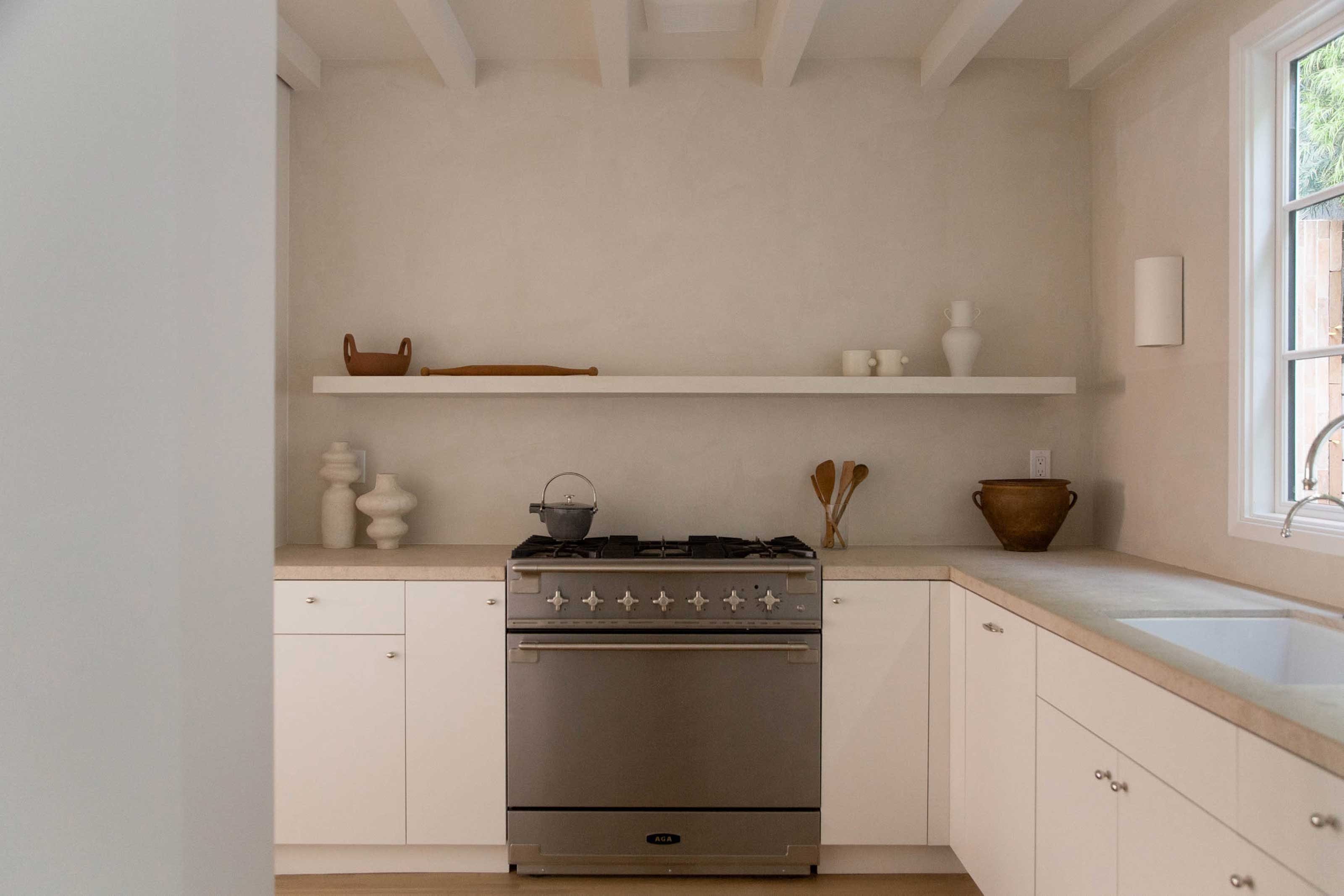

When you first walk into my kitchen, you might get a sense that something's missing. You probably won't clock it at first, but when it comes up in conversation, my house guests are often shocked that I don't have a microwave.
'How do you reheat food?' 'How do you cooking microwave meals?' They're all pretty common questions, but generally I find that people fall into two camps when it comes to microwave use. Some people use theirs all the time, some people hardly ever at all. I fell into the latter, so I decided to free up countertop space and be done with including a microwave at all. And I think, it's the best thing I could have done for my kitchen.
However I do recognize that, to some, it's a necessity, especially for busy parents or anyone that may struggle to use other types of cooking appliances. The question is, is there a way to incorporate a microwave that's not a countertop atrocity so that I can enjoy my minimalist kitchen?
I asked three interior designers - Lauren Moore of Design Assembly, Ahmad AbouZanat of PROJECT AZ, and Lauren Woods of Lauren Woods Interiors - for their thoughts on including a microwave - and as it turns out, three out of three interior designers agree with me that a microwave really is a bit of an eyesore. When it's a must-have for their clients, this is how they approach including one in the design.
'I don't like to look at a microwave'
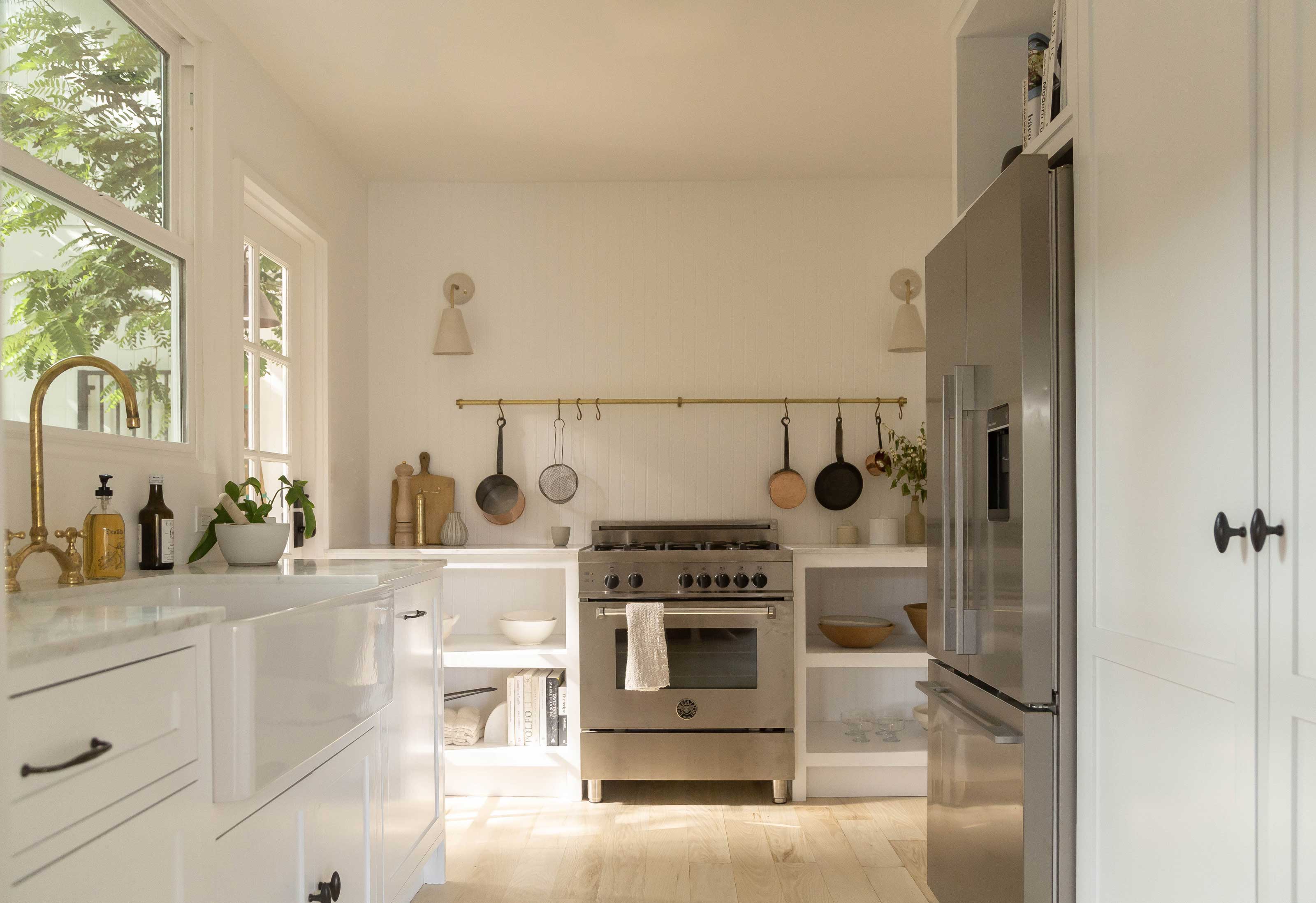
For Lauren Moore, founder of interior design studio Design Assembly, a microwave should not be on show. 'In my own home, I have stringent principles around loving the things I look at every day, and cluttered kitchens make me uneasy - for me that means no visible microwaves (or other kitchen countertop appliances) and no TVs in main living spaces,' Lauren tells me.
'I don't like to look at microwaves, but as a parent I do understand the convenience.' Integrating a microwave, or creating a space to hide it away within a kitchen, is Lauren's best solution. 'I always want to make sure clients get what they need out of their kitchen, so if it is a must-have for a client, my strategy there is to conceal it as much as possible- in a custom drawer or cabinet, or out of the way in a butler's pantry, etc,' she explains.
'There are simple and harmonious solutions'
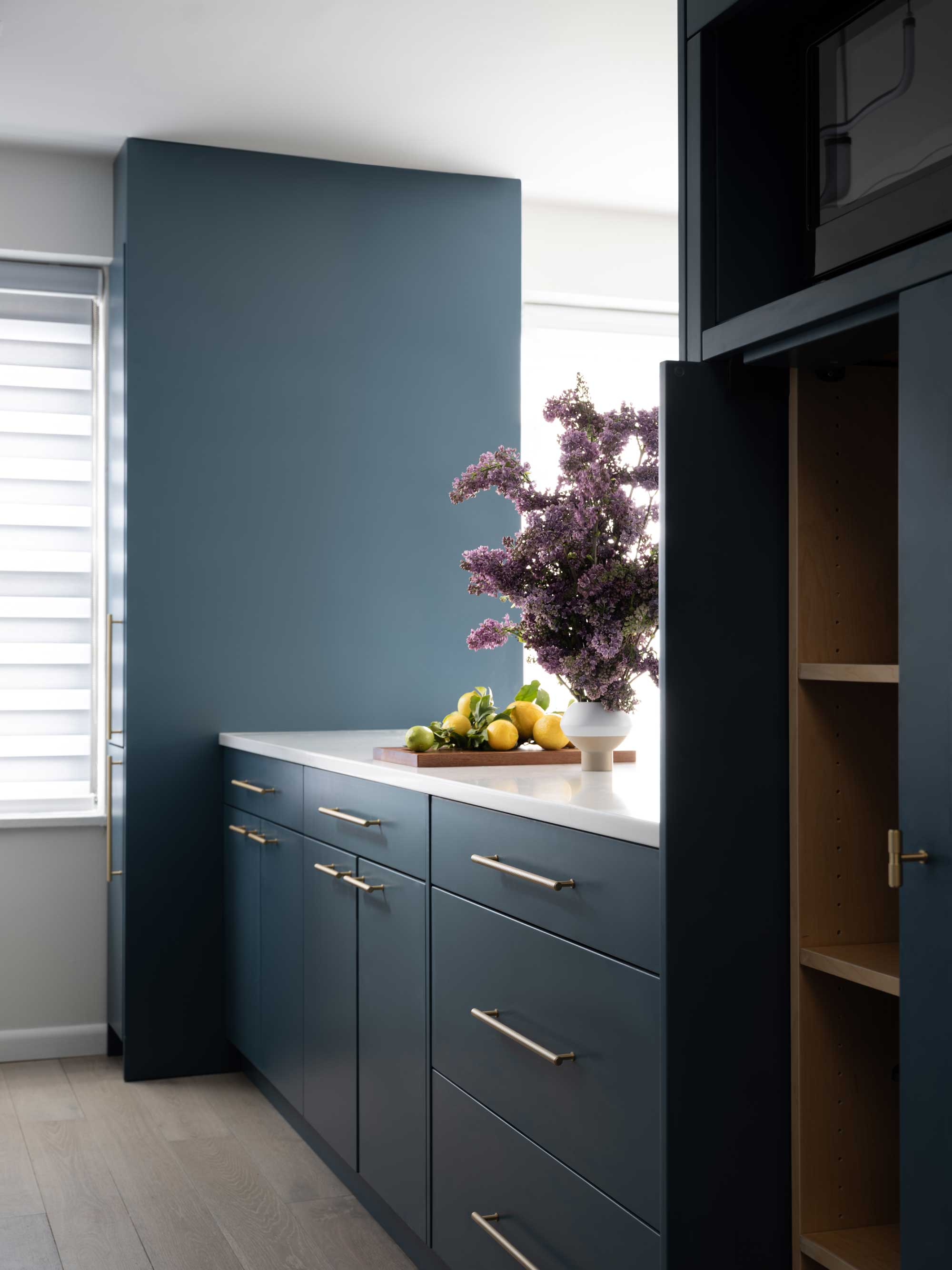
New York-based interior designer Ahmad AbouZanat does have a microwave, but doesn't use it too often and doesn't have it on show. 'In my opinion, having the microwave on display is an eyesore, especially with kitchens that are open to other spaces,' Ahmad tells me. 'There are a couple of brands, such as Cafe Appliances and Wolf, that have pushed the microwave design aesthetic to a more appealing and sophisticated combination of materials and shapes,' he adds, 'but despite these new, high-end designs, I still feel microwaves are not the prettiest objects to put on view in a kitchen.'
When designing for clients, it's a personal choice. 'It's always important to ask the client if they have a preference either way and to understand how they live in and use their kitchen on a day-to-day basis,' Ahmad says. 'In one of my projects, it was essential for my client to have a microwave. When that's the case, I do my best to have the microwave concealed or placed somewhere that isn’t visible to other spaces, such as in an open floor plan layout.'
Ahmad has a few such tactics to make a microwave work, even when space is limited. 'Placing a microwave within the kitchen island or lower cabinetry is one of the most simple and harmonious solutions,' he says. 'You can either create a cubby-like place for a free-standing microwave or use one that can be installed as a built-in microwave.'
'In my Grand Street project (pictured), the kitchen was a huge transformation. The original kitchen had standard lower and upper cabinetry with empty and unused space,' Ahmad explains. 'We closed part of that off and created floor to ceiling cabinetry with pocket doors where the microwave is placed. When shut, the cabinetry is seamless and clean. When needed, the microwave is accessible at a height that was set per my client's preference.'
'A built-in version is a cleaner look'
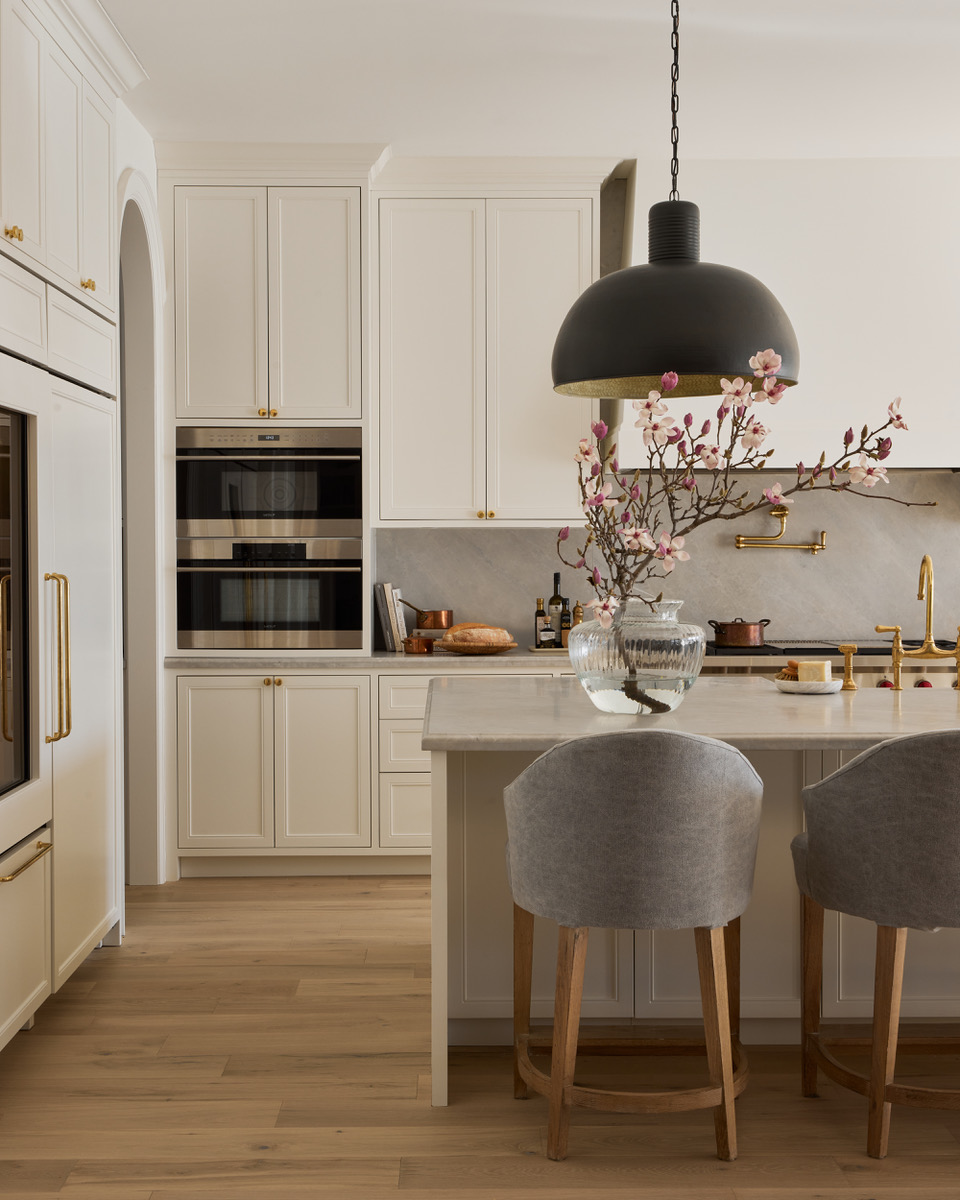
'Truthfully, microwaves are aesthetically not my favorite thing to incorporate into a design, but it is client driven,' interior designer Lauren Woods explains. 'Some tend to either be in the camp of “I can’t live without it” or “I use it basically never”. For the former, its important that it be integrated in a seamless way.'
In truth, an integrated microwave is much less of an issues than a countertop version, so 'if budget permits, a built in version is a cleaner look,' Lauren advises.
If space is more your concern, doubling up functions can make a microwave a more worthwhile investment of your kitchen's square footage. 'I tend to gravitate more towards a multi function version of a microwave, known as a speed oven, which has both a convection oven function as well as a microwave function,' Lauren tells us.
'Some additional suggestions on where to place this appliance include within the island (on the working side where your guests cannot see it), or within a pantry space,' Lauren adds.
How do I prepare food without a microwave?
There isn't really anything that needs to be cooked in a microwave that can't be cooked some other way in your kitchen. My first investment after deciding to ditch the microwave was a pan with a steamer basket, so that I could steam vegetables, packet rice and more easily - I opted for the Always Pan from Our Place.
'I prefer an air fryer as something that can be tucked away more easily and does the same job,' says Lauren Moore. That may be, I think, my biggest gripe with the microwave. It's actually pretty enormous for a countertop appliance, making it harder to hide away. With air fryers becoming a more common kitchen appliance, and being lighter and easy to bring out as and when you need to use it or hidden in an appliance garage, I'd be happy to see the microwave take a back seat in our kitchens for good.
Be The First To Know
The Livingetc newsletters are your inside source for what’s shaping interiors now - and what’s next. Discover trend forecasts, smart style ideas, and curated shopping inspiration that brings design to life. Subscribe today and stay ahead of the curve.

Luke Arthur Wells is a freelance design writer, award-winning interiors blogger and stylist, known for neutral, textural spaces with a luxury twist. He's worked with some of the UK's top design brands, counting the likes of Tom Dixon Studio as regular collaborators and his work has been featured in print and online in publications ranging from Domino Magazine to The Sunday Times. He's a hands-on type of interiors expert too, contributing practical renovation advice and DIY tutorials to a number of magazines, as well as to his own readers and followers via his blog and social media. He might currently be renovating a small Victorian house in England, but he dreams of light, spacious, neutral homes on the West Coast.
-
 These Are the Flower Crowns I’m Wearing This Spring (Spoiler: They’re Actually for My Door)
These Are the Flower Crowns I’m Wearing This Spring (Spoiler: They’re Actually for My Door)Coachella confirmed the comeback of flower crowns. At home, they just go by another name: the spring wreath
By Julia Demer
-
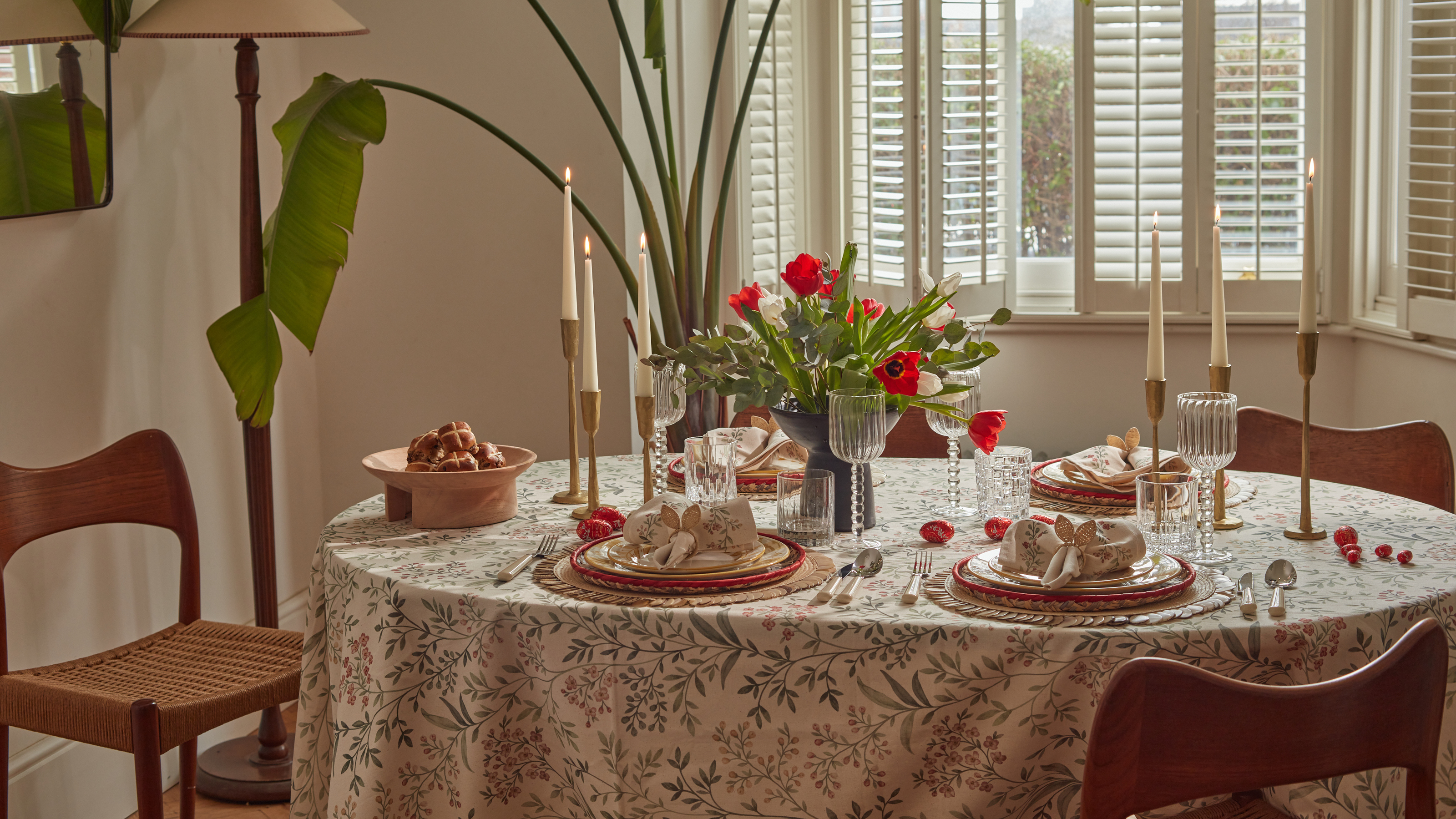 Bunny Ears, Be Gone — 7 Easter Table Styling Mistakes That Will Take Your Setting from Tawdry to Tasteful
Bunny Ears, Be Gone — 7 Easter Table Styling Mistakes That Will Take Your Setting from Tawdry to TastefulFrom fussy floral displays that disrupt conversation to over-relying on tacky tropes, don't fall victim to these errors when decorating your Easter table
By Lilith Hudson